Abstract
Increased plasma adrenalin (A) levels following arecoline in normal subjects and patients with multiple system atrophy (MSA) may result from nicotinic adrenal stimulation. Lack of this response in patients with pure autonomic failure (PAF) is consistent with peripheral sympathetic dysfunction. The mechanisms underlying diminished plasma corticotropin (ACTH) responses to arecoline may differ in patients with autonomic failure. Hypothalamic, cholinergic degeneration could prevent the response in MSA whereas patients with PAF do not manifest the normal increase in A which may be required to elicit an ACTH response. The appearance and exacerbation of tremor, vertigo, and pathological affect in the MSA group suggest that some central cholinergic receptors remain functional.
Full text
PDF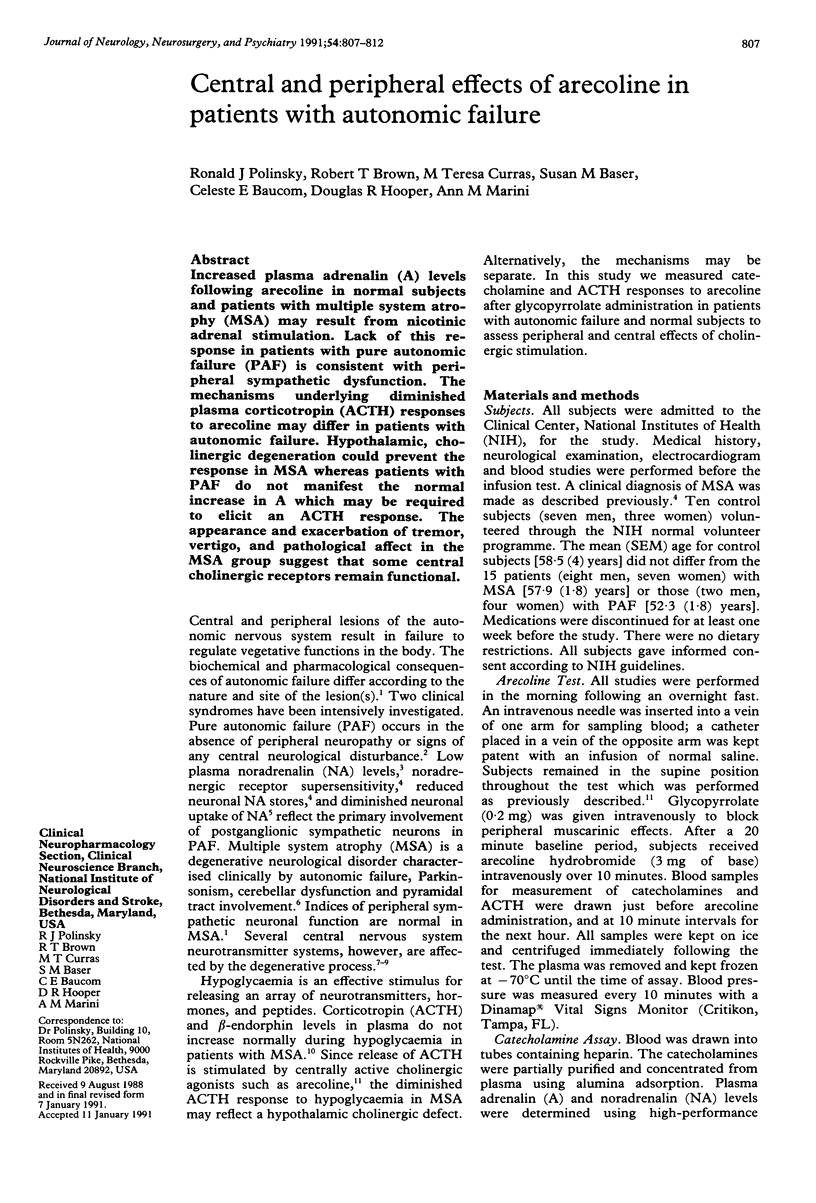
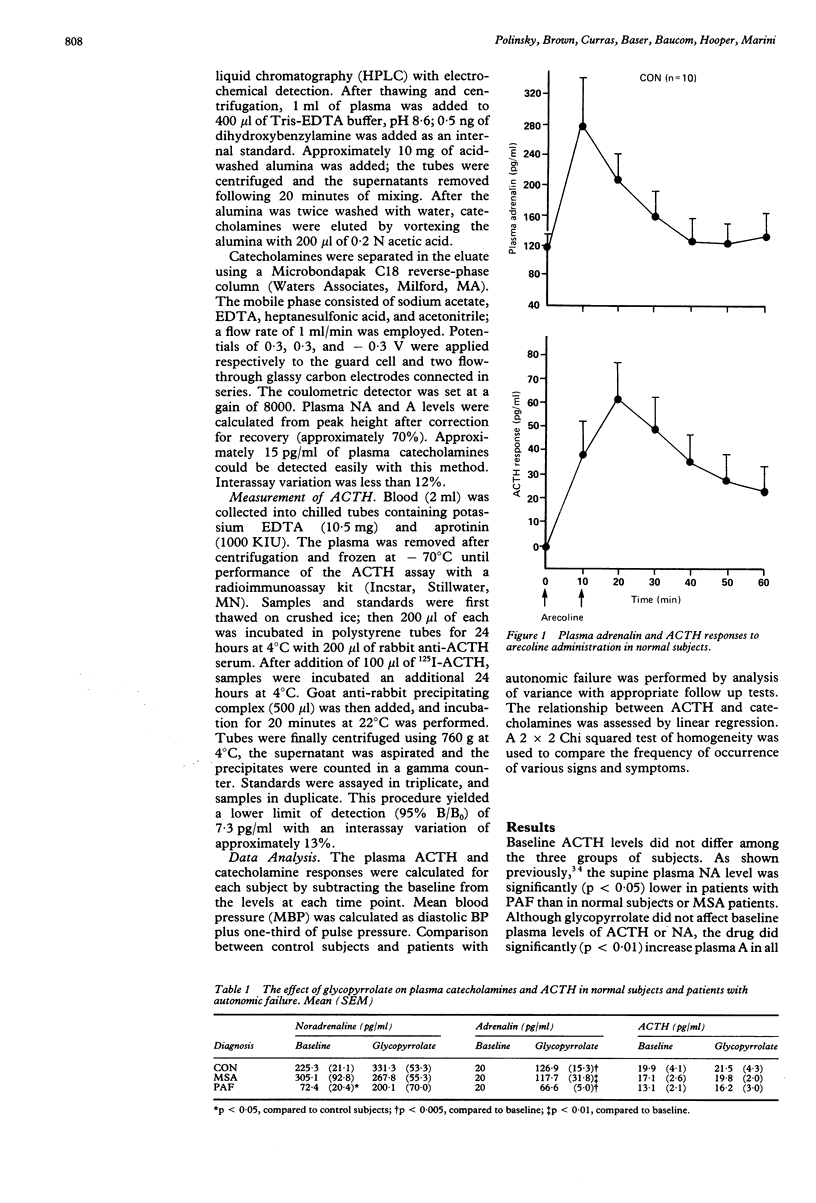
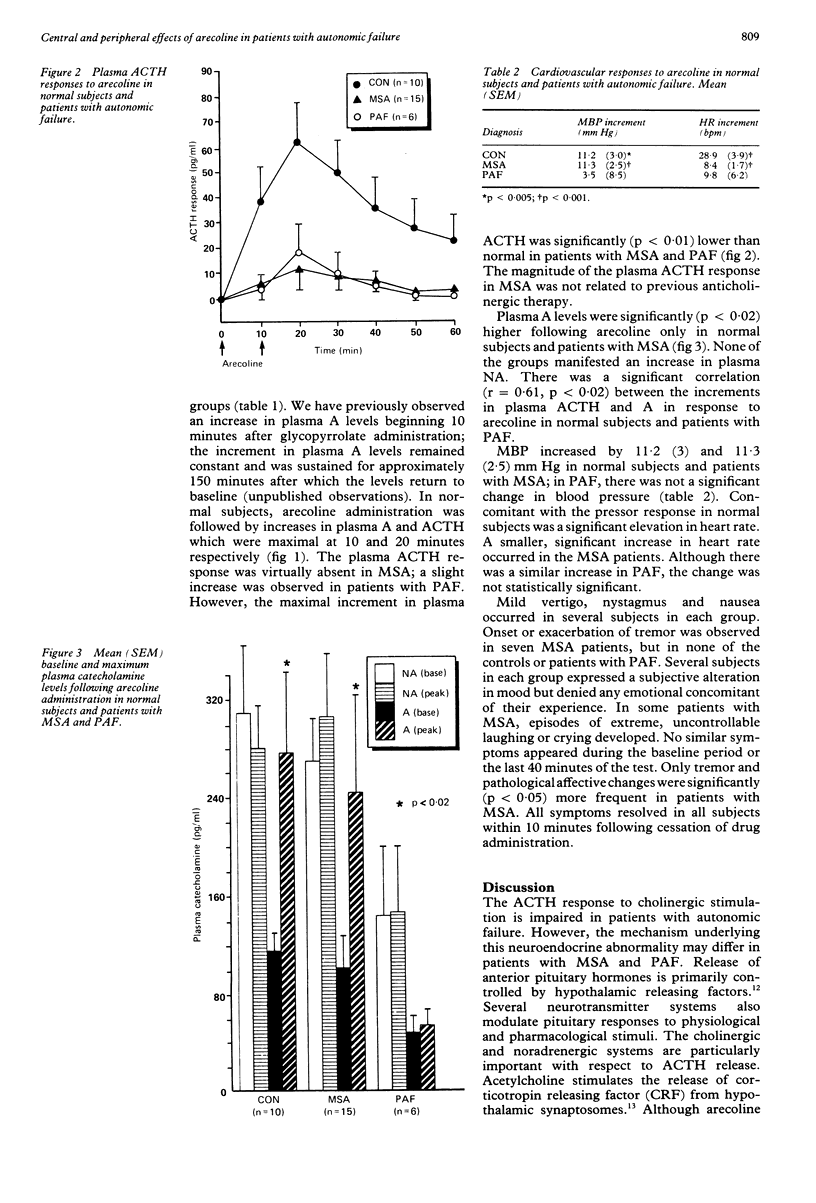
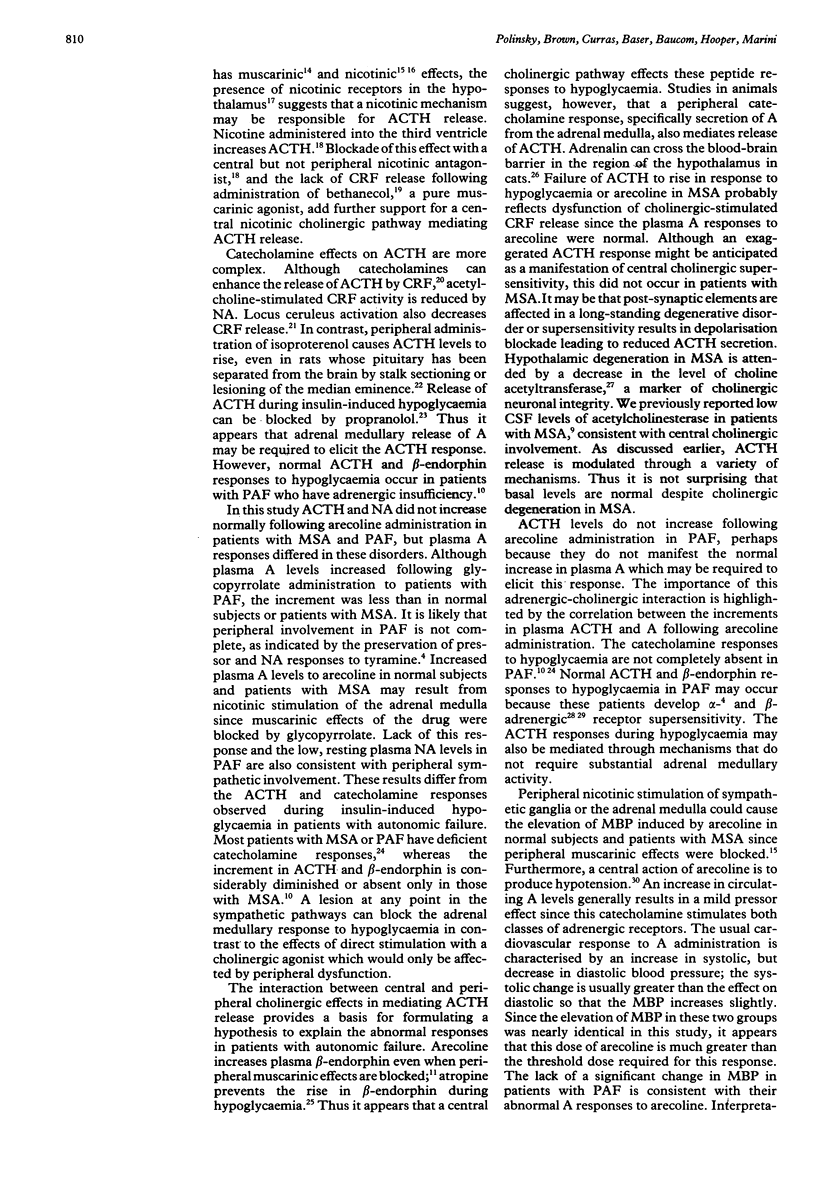
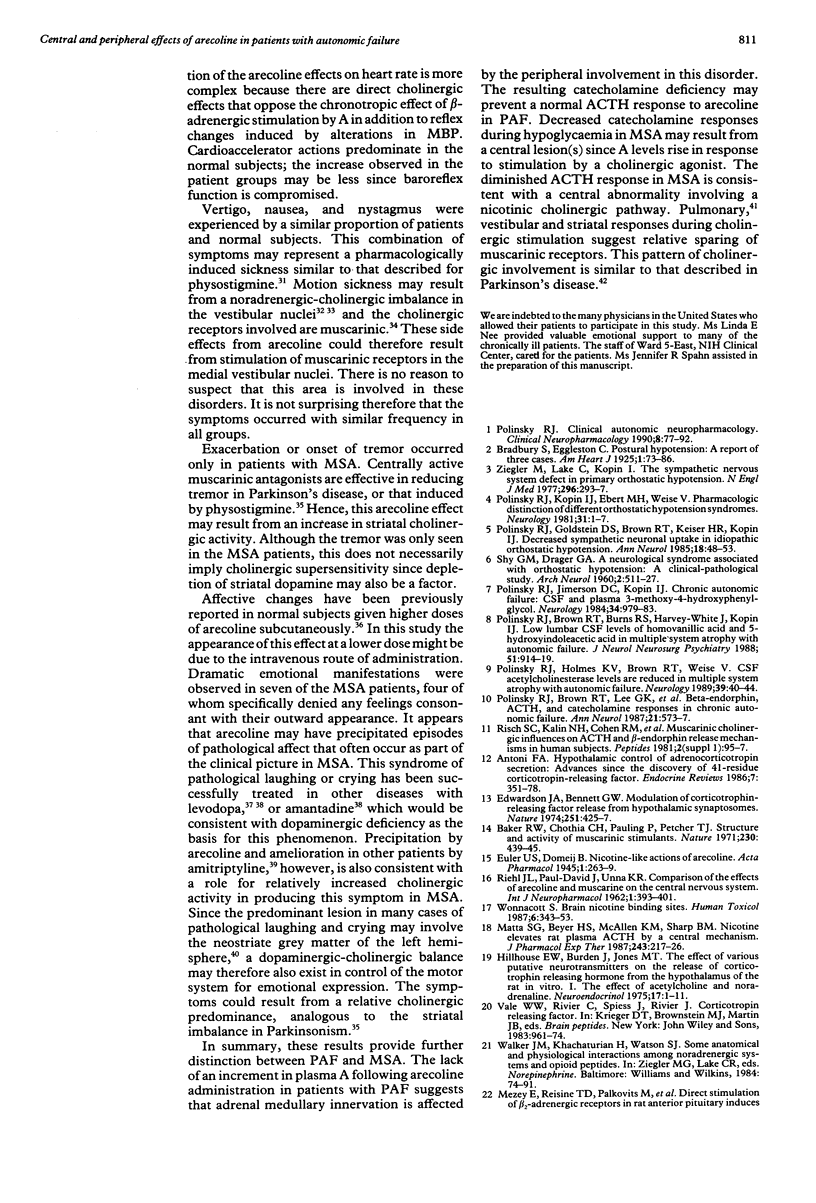
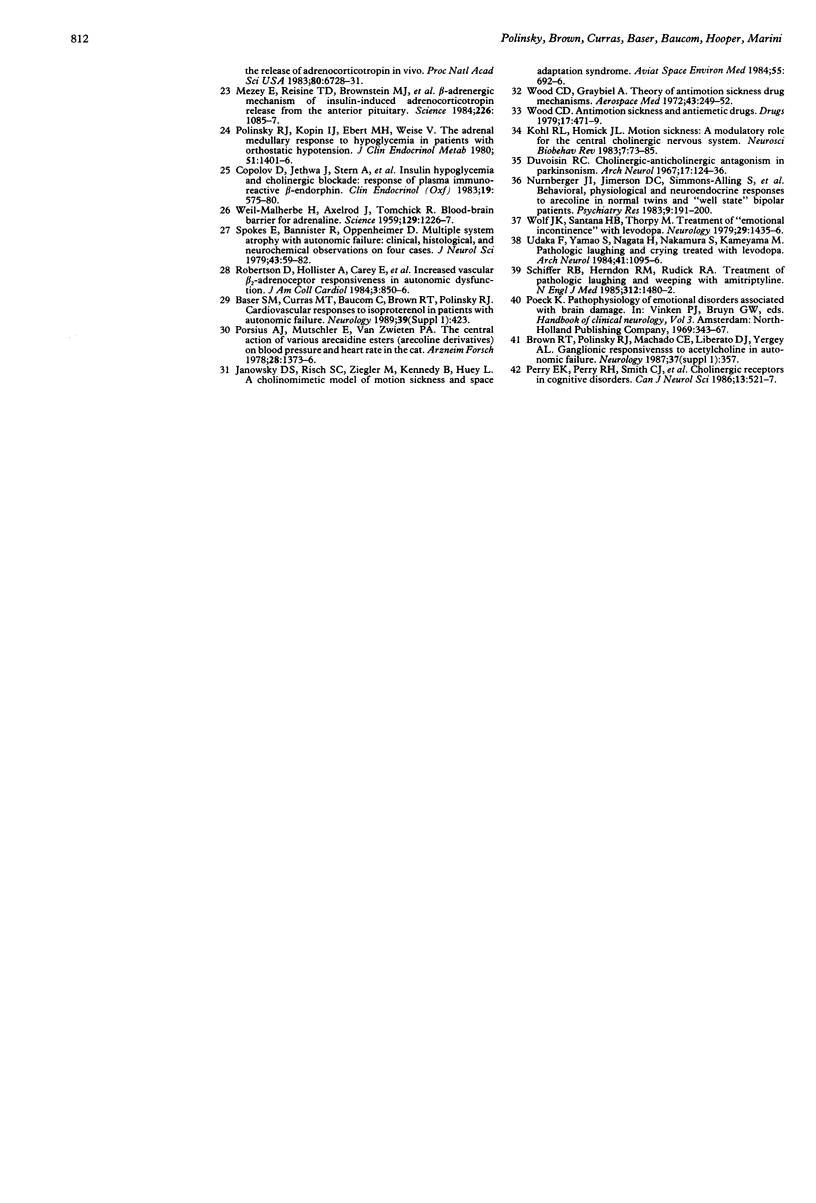
Selected References
These references are in PubMed. This may not be the complete list of references from this article.
- Antoni F. A. Hypothalamic control of adrenocorticotropin secretion: advances since the discovery of 41-residue corticotropin-releasing factor. Endocr Rev. 1986 Nov;7(4):351–378. doi: 10.1210/edrv-7-4-351. [DOI] [PubMed] [Google Scholar]
- Baker R. W., Chothia C. H., Pauling P., Petcher T. J. Structure and activity of muscarinic stimulants. Nature. 1971 Apr 16;230(5294):439–445. doi: 10.1038/230439a0. [DOI] [PubMed] [Google Scholar]
- Copolov D., Jethwa J., Stern A., Clements J., Funder J. W. Insulin hypoglycaemia and cholinergic blockade: response of plasma immunoreactive beta-endorphin. Clin Endocrinol (Oxf) 1983 Nov;19(5):575–580. doi: 10.1111/j.1365-2265.1983.tb00033.x. [DOI] [PubMed] [Google Scholar]
- Duvoisin R. C. Cholinergic-anticholinergic antagonism in parkinsonism. Arch Neurol. 1967 Aug;17(2):124–136. doi: 10.1001/archneur.1967.00470260014002. [DOI] [PubMed] [Google Scholar]
- Edwardson J. A., Bennett G. W. Modulation of corticotrophin-releasing factor release from hypothalamic synaptosomes. Nature. 1974 Oct 4;251(5474):425–427. doi: 10.1038/251425a0. [DOI] [PubMed] [Google Scholar]
- Feasby T. E., Gilbert J. J., Brown W. F., Bolton C. F., Hahn A. F., Koopman W. J., Zochodne D. W. Acute "axonal" Guillain-Barré polyneuropathy. Neurology. 1987 Feb;37(2):357–357. doi: 10.1212/wnl.37.2.357-b. [DOI] [PubMed] [Google Scholar]
- Hillhouse E. W., Burden J., Jones M. T. The effect of various putative neurotransmitters on the release of corticotrophin releasing hormone from the hypothalamus of the rat in vitro. I. The effect of acetylcholine and noradrenaline. Neuroendocrinology. 1975;17(1):1–11. doi: 10.1159/000122335. [DOI] [PubMed] [Google Scholar]
- Janowsky D. S., Risch S. C., Ziegler M., Kennedy B., Huey L. A cholinomimetic model of motion sickness and space adaptation syndrome. Aviat Space Environ Med. 1984 Aug;55(8):692–696. [PubMed] [Google Scholar]
- Kohl R. L., Homick J. L. Motion sickness: a modulatory role for the central cholinergic nervous system. Neurosci Biobehav Rev. 1983 Spring;7(1):73–85. doi: 10.1016/0149-7634(83)90008-8. [DOI] [PubMed] [Google Scholar]
- Matta S. G., Beyer H. S., McAllen K. M., Sharp B. M. Nicotine elevates rat plasma ACTH by a central mechanism. J Pharmacol Exp Ther. 1987 Oct;243(1):217–226. [PubMed] [Google Scholar]
- Mezey E., Reisine T. D., Brownstein M. J., Palkovits M., Axelrod J. Beta-adrenergic mechanism of insulin-induced adrenocorticotropin release from the anterior pituitary. Science. 1984 Nov 30;226(4678):1085–1087. doi: 10.1126/science.6093262. [DOI] [PubMed] [Google Scholar]
- Mezey E., Reisine T. D., Palkovits M., Brownstein M. J., Axelrod J. Direct stimulation of beta 2-adrenergic receptors in rat anterior pituitary induces the release of adrenocorticotropin in vivo. Proc Natl Acad Sci U S A. 1983 Nov;80(21):6728–6731. doi: 10.1073/pnas.80.21.6728. [DOI] [PMC free article] [PubMed] [Google Scholar]
- Nurnberger J. I., Jr, Jimerson D. C., Simmons-Alling S., Tamminga C., Nadi N. S., Lawrence D., Sitaram N., Gillin J. C., Gershon E. S. Behavioral, physiological, and neuroendocrine responses to arecoline in normal twins and "well state" bipolar patients. Psychiatry Res. 1983 Jul;9(3):191–200. doi: 10.1016/0165-1781(83)90043-4. [DOI] [PubMed] [Google Scholar]
- Perry E. K., Perry R. H., Smith C. J., Purohit D., Bonham J., Dick D. J., Candy J. M., Edwardson J. A., Fairbairn A. Cholinergic receptors in cognitive disorders. Can J Neurol Sci. 1986 Nov;13(4 Suppl):521–527. doi: 10.1017/s0317167100037240. [DOI] [PubMed] [Google Scholar]
- Polinsky R. J., Brown R. T., Burns R. S., Harvey-White J., Kopin I. J. Low lumbar CSF levels of homovanillic acid and 5-hydroxyindoleacetic acid in multiple system atrophy with autonomic failure. J Neurol Neurosurg Psychiatry. 1988 Jul;51(7):914–919. doi: 10.1136/jnnp.51.7.914. [DOI] [PMC free article] [PubMed] [Google Scholar]
- Polinsky R. J., Brown R. T., Lee G. K., Timmers K., Culman J., Foldes O., Kopin I. J., Recant L. Beta-endorphin, ACTH, and catecholamine responses in chronic autonomic failure. Ann Neurol. 1987 Jun;21(6):573–577. doi: 10.1002/ana.410210608. [DOI] [PubMed] [Google Scholar]
- Polinsky R. J. Clinical autonomic neuropharmacology. Neurol Clin. 1990 Feb;8(1):77–92. [PubMed] [Google Scholar]
- Polinsky R. J., Goldstein D. S., Brown R. T., Keiser H. R., Kopin I. J. Decreased sympathetic neuronal uptake in idiopathic orthostatic hypotension. Ann Neurol. 1985 Jul;18(1):48–53. doi: 10.1002/ana.410180109. [DOI] [PubMed] [Google Scholar]
- Polinsky R. J., Holmes K. V., Brown R. T., Weise V. CSF acetylcholinesterase levels are reduced in multiple system atrophy with autonomic failure. Neurology. 1989 Jan;39(1):40–44. doi: 10.1212/wnl.39.1.40. [DOI] [PubMed] [Google Scholar]
- Polinsky R. J., Jimerson D. C., Kopin I. J. Chronic autonomic failure: CSF and plasma 3-methoxy-4-hydroxyphenylglycol. Neurology. 1984 Jul;34(7):979–983. doi: 10.1212/wnl.34.7.979. [DOI] [PubMed] [Google Scholar]
- Polinsky R. J., Kopin I. J., Ebert M. H., Weise V. Pharmacologic distinction of different orthostatic hypotension syndromes. Neurology. 1981 Jan;31(1):1–7. doi: 10.1212/wnl.31.1.1. [DOI] [PubMed] [Google Scholar]
- Polinsky R. J., Kopin I. J., Ebert M. H., Weise V. The adrenal medullary response to hypoglycemia in patients with orthostatic hypotension. J Clin Endocrinol Metab. 1980 Dec;51(6):1401–1406. doi: 10.1210/jcem-51-6-1401. [DOI] [PubMed] [Google Scholar]
- Porsius A. J., Mutschler E., Van Zwieten P. A. The central action of various arecaidine esters (arecoline derivatives) on blood pressure and heart rate in the cat. Comparison with the peripheral effects. Arzneimittelforschung. 1978;28(8):1373–1376. [PubMed] [Google Scholar]
- Risch S. C., Kalin N. H., Cohen R. M., Weker J. L., Insel T. R., Cohen M. L., Murphy D. L. Muscarinic cholinergic influences on ACTH and beta-endorphin release mechanisms in human subjects. Peptides. 1981;2 (Suppl 1):95–97. doi: 10.1016/0196-9781(81)90062-0. [DOI] [PubMed] [Google Scholar]
- Robertson D., Hollister A. S., Carey E. L., Tung C. S., Goldberg M. R., Robertson R. M. Increased vascular beta2-adrenoceptor responsiveness in autonomic dysfunction. J Am Coll Cardiol. 1984 Mar;3(3):850–856. doi: 10.1016/s0735-1097(84)80264-8. [DOI] [PubMed] [Google Scholar]
- SHY G. M., DRAGER G. A. A neurological syndrome associated with orthostatic hypotension: a clinical-pathologic study. Arch Neurol. 1960 May;2:511–527. doi: 10.1001/archneur.1960.03840110025004. [DOI] [PubMed] [Google Scholar]
- Schiffer R. B., Herndon R. M., Rudick R. A. Treatment of pathologic laughing and weeping with amitriptyline. N Engl J Med. 1985 Jun 6;312(23):1480–1482. doi: 10.1056/NEJM198506063122303. [DOI] [PubMed] [Google Scholar]
- Spokes E. G., Bannister R., Oppenheimer D. R. Multiple system atrophy with autonomic failure: clinical, histological and neurochemical observations on four cases. J Neurol Sci. 1979 Sep;43(1):59–82. doi: 10.1016/0022-510x(79)90073-x. [DOI] [PubMed] [Google Scholar]
- Udaka F., Yamao S., Nagata H., Nakamura S., Kameyama M. Pathologic laughing and crying treated with levodopa. Arch Neurol. 1984 Oct;41(10):1095–1096. doi: 10.1001/archneur.1984.04050210093023. [DOI] [PubMed] [Google Scholar]
- WEIL-MALHERBE H., AXELROD J., TOMCHICK R. Blood-brain barrier for adrenaline. Science. 1959 May 1;129(3357):1226–1227. doi: 10.1126/science.129.3357.1226. [DOI] [PubMed] [Google Scholar]
- Wolf J. K., Santana H. B., Thorpy M. Treatment of "emotional incontinence" with levodopa. Neurology. 1979 Oct;29(10):1435–1436. doi: 10.1212/wnl.29.10.1435-b. [DOI] [PubMed] [Google Scholar]
- Wonnacott S. Brain nicotine binding sites. Hum Toxicol. 1987 Sep;6(5):343–353. doi: 10.1177/096032718700600502. [DOI] [PubMed] [Google Scholar]
- Wood C. D. Antimotion sickness and antiemetic drugs. Drugs. 1979 Jun;17(6):471–479. doi: 10.2165/00003495-197917060-00003. [DOI] [PubMed] [Google Scholar]
- Wood C. D., Graybiel A. Theory of antimotion sickness drug mechanisms. Aerosp Med. 1972 Mar;43(3):249–252. [PubMed] [Google Scholar]
- Ziegler M. G., Lake C. R., Kopin I. J. The sympathetic-nervous-system defect in primary orthostatic hypotension. N Engl J Med. 1977 Feb 10;296(6):293–297. doi: 10.1056/NEJM197702102960601. [DOI] [PubMed] [Google Scholar]


